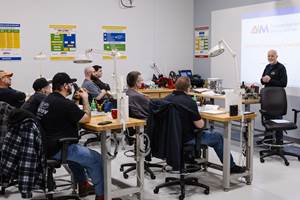Try an External Hiring Source
Great executives of moldmaking firms are not necessarily effective human resource people.
The ability to clearly discern which candidates are truly qualified is challenging. Increasingly moldmaking technicians must specialize in advanced machining, toolroom techniques and moldmaking processes unique to each project. Often there is a strong expectation that the new hire must have some knowledge of how to design and build a plastic injection mold. CNC precision manufacturing technicians are equally difficult to find. Those candidates with concentration on manual programming, computer-assisted programming, setup and operating CNC equipment, often lack the corresponding CAM required for more complex tooling and programming practices used in the industry.
One would hope that students learning to be machining technicians would gain fundamental skills in everything from basic shop skills to CNC programming and CAM. Shops with fewer than a thousand employees report a limited supply of trained machining experts. A fundamental understanding that numerical control machine operators run computer-controlled machines is absent; the inexperienced worker only knows that these machines cut, shape, drill or otherwise modify metal or plastic parts. These new workforce graduates are only able to recite that the computer program tells the machine which tools to use and how to use them. Even rudimentary knowledge of operator functionality (mainly set up, tend and maintain the machines) is lacking. Once the programs are entered, operators select, measure, install and secure the tools and attachments the machines will use; some of these processes require knowledge and expertise and greatly impact product accuracy and production efficiency.
There are skills simply not being taught. Operators must be able to read blueprints and use their knowledge of the job to select the proper tools. They use hand tools and precision instruments to attach the items and attach the workpieces and start the machines. Sounds pretty straight forward, yet the experienced technician, is vastly difficult to find.
Some believe that the downfall of the American workforce is the worker. In fact, it is the hiring process that defeats most moldmaking companies. The vetting, evaluation and screening process for workers is deeply flawed. The appropriate outside placement firm knows the right questions to ask and the right skills to test to ensure the needed abilities are well-matched to mold manufacturers.
In an economy, with unpredictable orders, there is an understandable hesitancy to add permanent staff. The commitment exceeds the added payroll, and includes benefits, training and other deep socio-cultural integration to a workplace environment. Hiring the right person, the first time, is a front-end process. The rigor to effectively assess is often a skillset lacking among moldmaking managers, with little or no profession human resource evaluation experience and training.
There are placement firms that specialize in just this field and act as the e-Harmony of job placement. It is a long, intensive, verifiable, replicated system, so the “marriage” created is a good fit. Because many placements start off in a temporary model (often shifting only the best workers to permanent staff), there is far less risk for moldmakers using this type of program.
Workers and companies are dating, courting each other to see if both parties think it is a match. Because of the intensive pre-screening, the chances for a complete mismatch are low using an external hiring approach.
Allowing outside, experienced, well-versed placement firms work for you will create a chance for moldmakers to do what they do best, manufacture high-quality products; not human resource vetting. It is about finding “the right” person for every job, every time.
Contributor:
Thomas R. Cutler is the President & CEO of TR Cutler, Inc. and Keith Wisner is Division vice-president for ResourceMFG.
For More Information:
ResourceMFG
resourcemfg.com
TR Cutler, Inc.
trcutler@trcutlerinc.com
trcutlerinc.com
Related Content
Making Mentoring Work | MMT Chat Part 2
Three of the TK Mold and Engineering team in Romeo, Michigan join me for Part 2 of this MMT Chat on mentorship by sharing how the AMBA’s Meet a Mentor Program works, lessons learned (and applied) and the way your shop can join this effort.
Read MoreMold Maintenance Continues to Matter: Enhanced Training Program in a New Facility
I attended a MoldTrax mold maintenance workshop in 2019 and shared my experiences, and despite changes in ownership, the workshop's remarkable value endures, as discussed in a recent Q&A with the current leadership.
Read MoreMMT Chats: The Science of Moldmaking, Part 2
In Part 2 of this two-part MMT Chat, Christina and Don continue their conversation by exploring lean manufacturing and tips on how to attract, train and retain the future workforce.
Read MoreHow to Foster Innovation Through a Culture of Education, Mentoring
Dynamic Tool Corp. shares its strategy for building a team with the right attitude and aptitude to deliver innovation that meets customer expectations.
Read MoreRead Next
The Mold Shop Puzzle: Lean Applied
Creating Constructive Change: Lean Applied.
Read MoreHow to Use Continuing Education to Remain Competitive in Moldmaking
Continued training helps moldmakers make tooling decisions and properly use the latest cutting tool to efficiently machine high-quality molds.
Read MoreAre You a Moldmaker Considering 3D Printing? Consider the 3D Printing Workshop at NPE2024
Presentations will cover 3D printing for mold tooling, material innovation, product development, bridge production and full-scale, high-volume additive manufacturing.
Read More




















